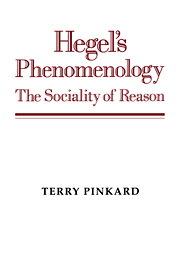Book contents
- Frontmatter
- Contents
- Acknowledgments
- Hegel's Phenomenology
- 1 Why the Phenomenology of Spirit?
- 2 The claims to self-sufficient knowledge: sense-certainty, perception, understanding
- 3 The claims of self-sufficient agency: freedom and self-consciousness
- 4 Modern life's project of self-justification
- 5 Modern life's alternatives and modern life's possibilities
- 6 The self-reflection of the human community
- 7 The essential structure of modern life
- Notes
- Works cited
- Index
2 - The claims to self-sufficient knowledge: sense-certainty, perception, understanding
Published online by Cambridge University Press: 05 September 2014
- Frontmatter
- Contents
- Acknowledgments
- Hegel's Phenomenology
- 1 Why the Phenomenology of Spirit?
- 2 The claims to self-sufficient knowledge: sense-certainty, perception, understanding
- 3 The claims of self-sufficient agency: freedom and self-consciousness
- 4 Modern life's project of self-justification
- 5 Modern life's alternatives and modern life's possibilities
- 6 The self-reflection of the human community
- 7 The essential structure of modern life
- Notes
- Works cited
- Index
Summary
Sense-certainty
What would immediate knowledge be?
It has often seemed puzzling to both the casual and the initiated reader of Hegel's Phenomenology that a book whose longest portions seem to concern themselves with cultural, social, and ethical issues begins with some very abstruse chapters on the nature of consciousness, perception, and theory-formation instead of simply beginning with various problems relating to social self-identity or problems in the philosophy of religion. Yet Hegel insists in the introduction to the Phenomenology that it offers a theory of knowledge, and that such a beginning is necessary for it.
The most obvious reason for Hegel to begin the Phenomenology with the chapters that he does is his professed belief that any philosophical system must begin without any presuppositions and develop everything out of that presuppositionless beginning. (Thus, just as the Science of Logic begins with “pure being,” the Phenomenology begins with “sense-certainty.”) However, the more basic and systemic reasons for the introductory sections to take the form that they do have to do with Hegel's general aim in the Phenomenology to show that a wide variety of things, ranging from the rituals involved in Greek religious cults to the French Revolution, are in fact best understood as forms of knowledge (as what Hegel calls “formations of consciousness” – that is, as ways in which forms of life take certain types of reasons to be authoritative, mandatory for themselves), and, likewise, that all claims to knowledge are best understood as historically situated forms of social practice in which agents seek to affirm for themselves that the structures of their own thought and practice really match up with the way things are, or have to be.
- Type
- Chapter
- Information
- Hegel's PhenomenologyThe Sociality of Reason, pp. 20 - 45Publisher: Cambridge University PressPrint publication year: 1994



